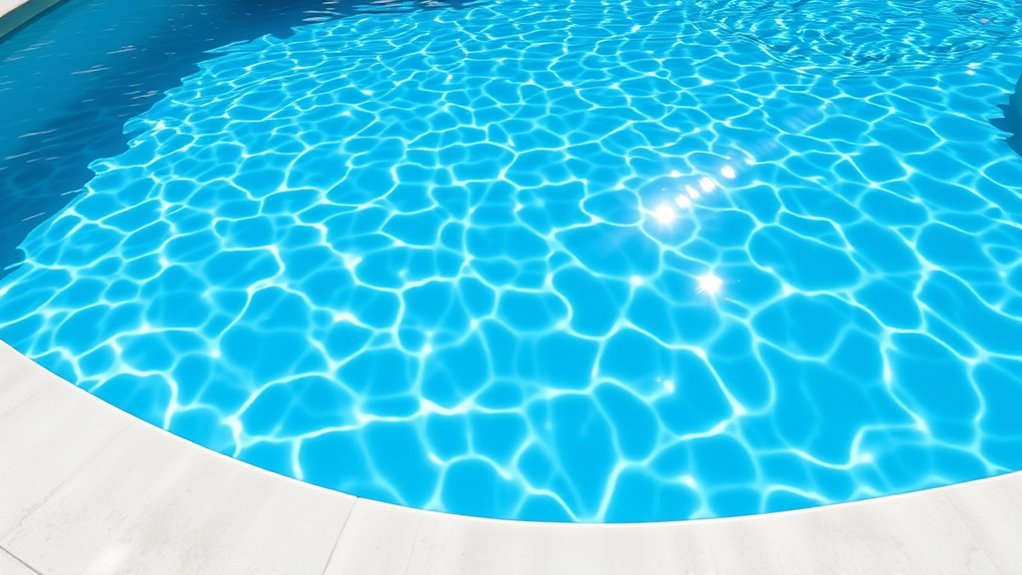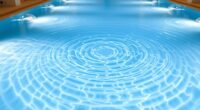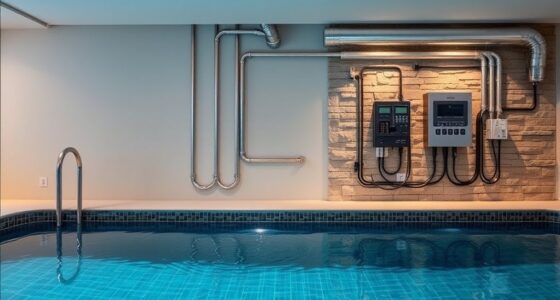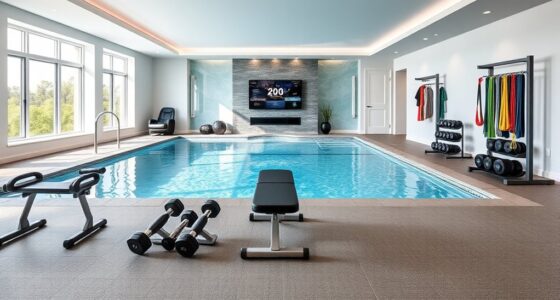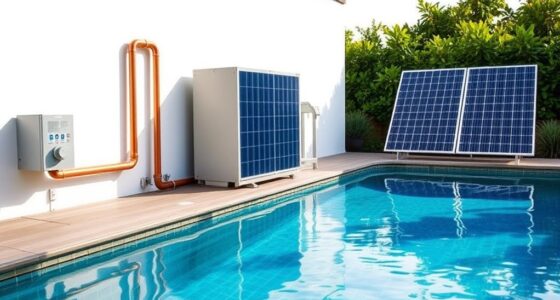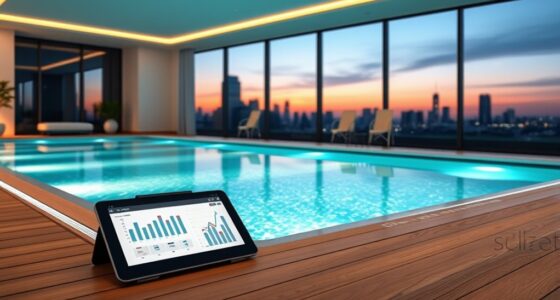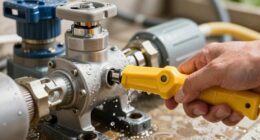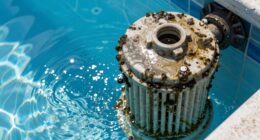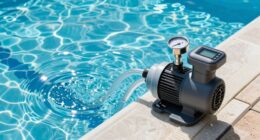To keep your Endless Pool water crystal clear, regularly test and balance chemicals like chlorine, pH, and alkalinity, ensuring levels stay within recommended ranges. Use a good filtration system properly by running it daily and cleaning filters often. Skim debris, brush the walls and floor weekly, and manage algae with proper chemical levels and coverage when not in use. Following these steps will help maintain pristine water—continue exploring for more tips on perfect pool clarity.
Key Takeaways
- Regularly test and balance chlorine, pH, and alkalinity to prevent cloudiness and maintain water clarity.
- Run the filtration system daily for 8-12 hours and clean filters regularly to ensure optimal water flow.
- Skim and brush the pool surfaces weekly to remove debris and prevent algae buildup.
- Use algaecides and cover the pool when not in use to limit sunlight exposure and algae growth.
- Address chemical imbalances promptly to avoid cloudiness, odors, and health issues.
Regularly Test and Balance Your Pool Chemicals
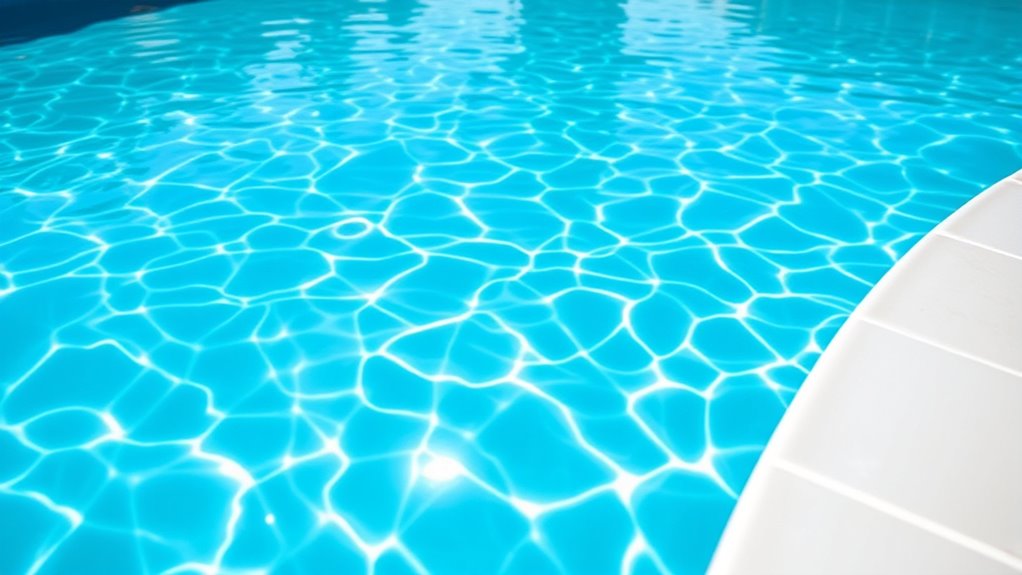
To keep your Endless Pool water clean and safe, you need to regularly test and balance your pool chemicals. Use a reliable test kit to check chlorine levels, pH, and alkalinity at least twice a week. Maintaining proper chlorine levels ensures bacteria and algae stay at bay, while balanced pH prevents skin irritation and equipment damage. If your chlorine is too low, add sanitizer; if it’s too high, dilute the water or wait for it to naturally decrease. Adjust pH and alkalinity using appropriate chemicals to keep the water balanced. Consistent testing and adjustments help prevent cloudy water, odors, and potential health issues. Staying on top of chemical levels keeps your Endless Pool sparkling, safe, and inviting for every swim. Color accuracy is essential for maintaining optimal visual quality and ensuring your viewing experience remains vivid and true to life.
Maintain Proper Ph and Alkalinity Levels
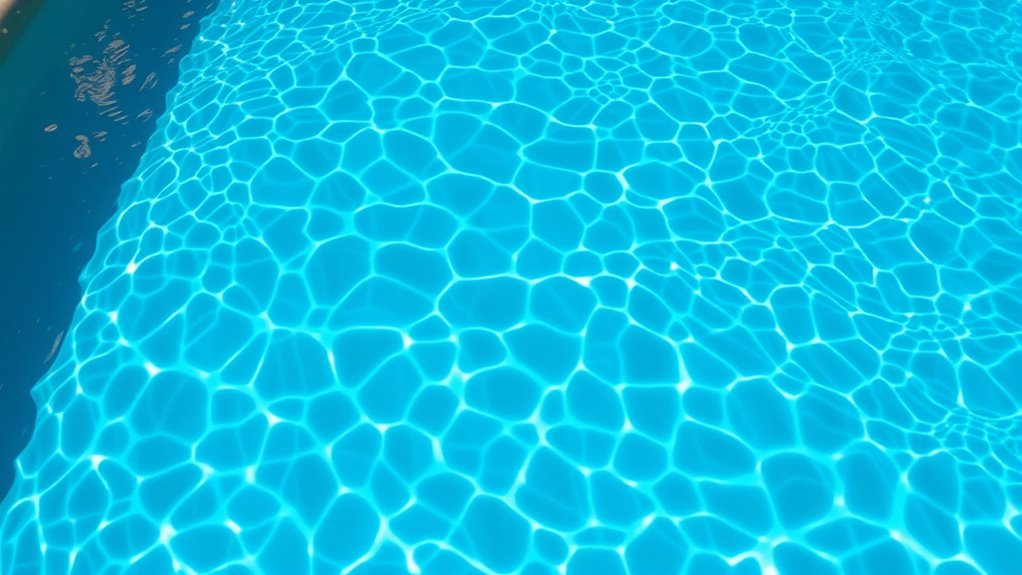
Maintaining proper pH and alkalinity levels is essential for keeping your Endless Pool water balanced and comfortable. If pH drops below 7.2, the water can become corrosive, irritating your skin and eyes, and damaging the pool equipment. Conversely, if it rises above 7.8, the water may become cloudy and scale can form on surfaces. Alkalinity acts as a buffer, stabilizing pH levels and preventing sudden changes. You should regularly test both using reliable test strips or a digital tester. Keep pH between 7.4 and 7.6, and alkalinity between 80 and 120 ppm. Adjust these levels with pH increasers or decreasers and alkalinity supplements as needed. Consistent monitoring helps prevent water problems and keeps your pool water clear and inviting.
Use the Right Filtration System Effectively
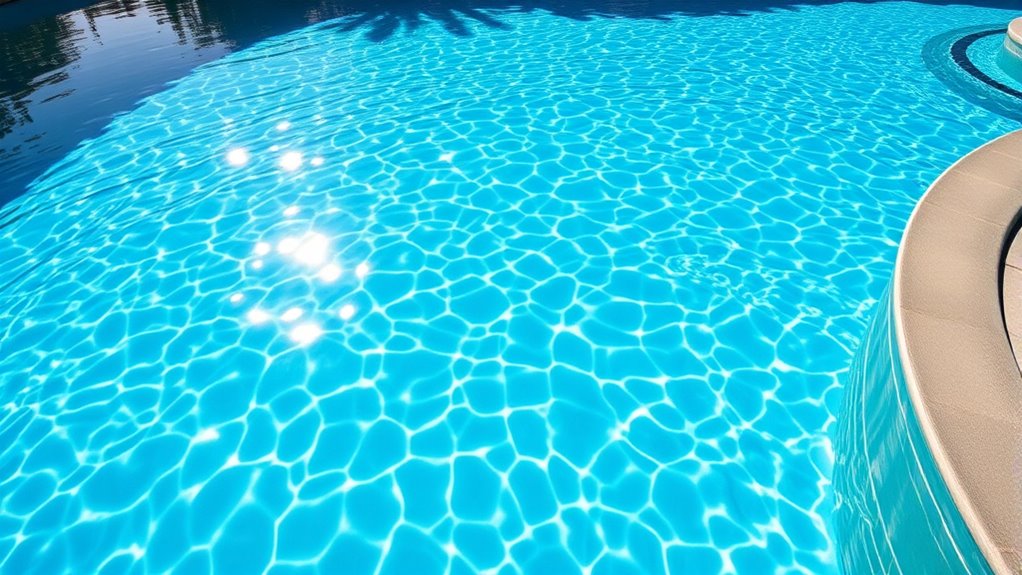
Choosing the right filtration system and using it effectively is essential for keeping your Endless Pool water clean and clear. Start by selecting a filtration system designed for your pool size and usage. A high-quality pump and filter combination guarantees proper circulation and debris removal. Run the filter daily for at least 8-12 hours, especially during heavy use or warm weather, to prevent dirt and algae buildup. Regularly clean or replace the filter to maintain peak performance. Avoid overloading the filter with large debris by skimming the surface frequently. Confirm the system’s flow rate matches the pool’s volume for efficient filtration. Proper use of your filtration system minimizes algae growth, reduces cloudiness, and keeps your water sparkling clean. Additionally, considering Kia Tuning options can optimize your pool’s performance and energy efficiency.
Implement Consistent Cleaning Routines
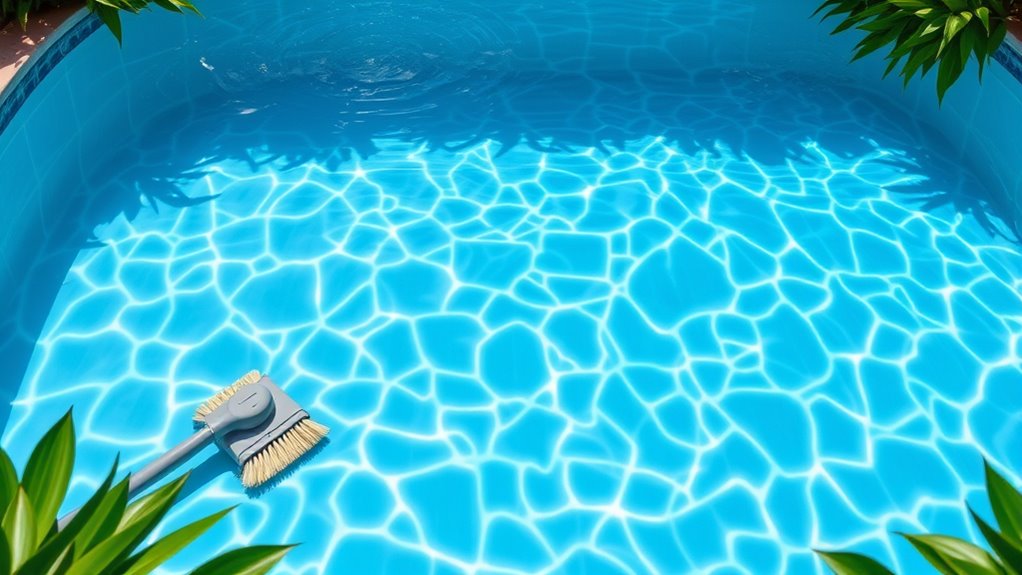
Consistent cleaning routines are essential for keeping your Endless Pool water pristine and healthy. Regularly skimming the surface removes leaves, insects, and debris before they sink and decay. Brushing the walls and floor weekly prevents buildup of grime and algae, making water maintenance easier. Don’t forget to clean the skimmer basket and filter regularly to ensure proper water flow and filtration. Using a pool vacuum weekly helps remove dirt settled at the bottom. Establishing a routine helps catch issues early, reducing the need for extensive chemical treatments later. Keep a cleaning schedule and stick to it, especially during heavy usage or after storms. By maintaining consistent cleaning habits, you’ll enjoy clear, inviting water with less effort and fewer problems down the line.
Manage and Prevent Algae Growth
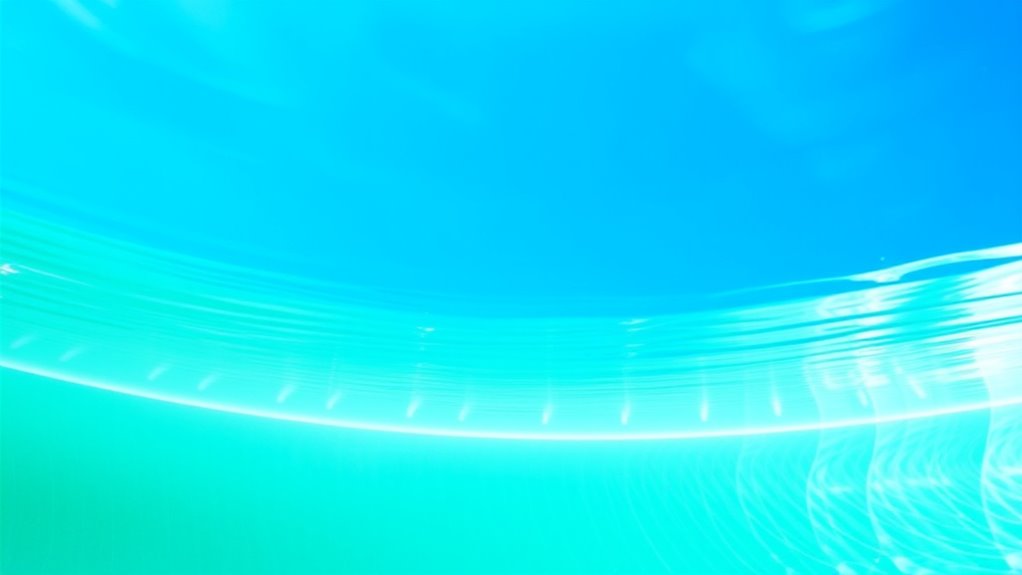
Algae can quickly take hold of your Endless Pool if you don’t stay vigilant, especially during warm, sunny days. Regularly check and maintain proper chemical levels, particularly chlorine or bromine, to keep algae at bay. Use algaecides as a preventive measure, following the manufacturer’s instructions carefully. Keep the pool covered when not in use to limit sunlight exposure, which fuels algae growth. Ensure your filtration system runs consistently—at least 8-12 hours daily—to remove nutrients that algae feed on. Maintain good water circulation and avoid stagnant spots. Also, clean the pool walls and floor regularly to prevent algae from taking hold. Proper water chemistry management is essential because imbalanced pH levels can promote algae growth. By staying proactive and vigilant, you’ll keep algae under control and your water crystal clear.
Shock Your Pool for Deep Cleaning
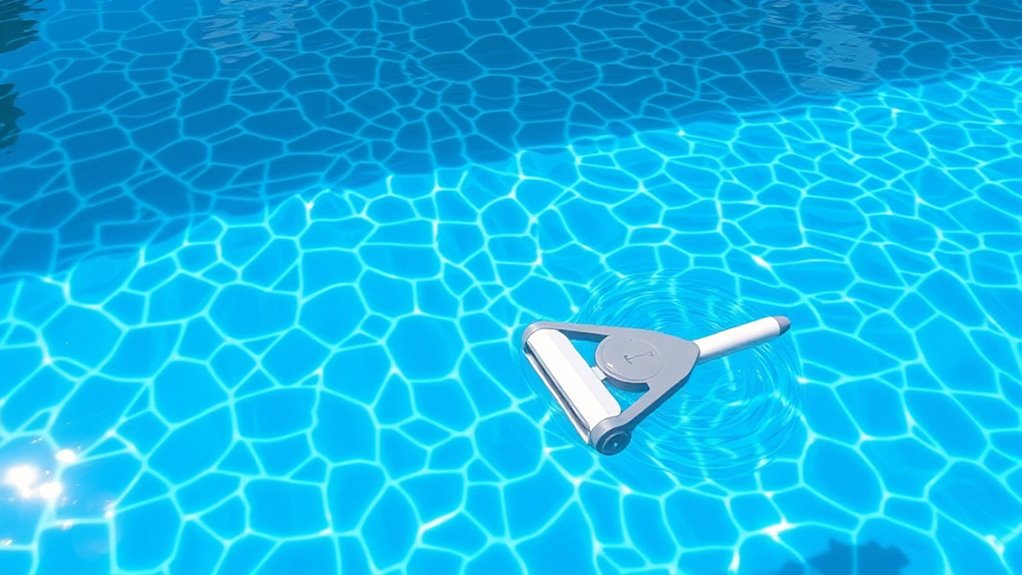
Even with regular maintenance to control algae, your pool can benefit from occasional deep cleaning to remove stubborn contaminants and restore water clarity. Shocking your pool involves adding a high dose of sanitizer to break down organic matter, algae, and bacteria hiding in the water and filters. This process disinfects thoroughly and revitalizes your pool’s appearance. To do it effectively, follow these steps:
| Step | Action | Tips |
|---|---|---|
| 1 | Test water pH | Keep it between 7.2–7.6 |
| 2 | Add shock treatment | Use non-chlorine or chlorine shock |
| 3 | Run filtration | Keep running for 8-12 hours |
Regular shocking keeps your water pristine and inviting.
Keep an Eye on Water Circulation and Turnover Rate

Are you monitoring your pool’s water circulation regularly? Proper circulation guarantees all water is filtered and sanitized effectively, preventing algae and bacteria growth. Check your pump and filter system to make sure they’re running long enough each day—typically 8 to 12 hours, depending on usage. Keep an eye on your turnover rate, which measures how many times the entire volume of water passes through the filtration system daily. A higher turnover rate means cleaner water. If circulation slows or you notice cloudy water, it’s time to troubleshoot your pump or filter. Maintaining your water circulation system is essential for optimal pool health. Regular monitoring helps identify issues early, keeping your Endless Pool water crystal clear and healthy. Regular circulation maintenance is a simple step that pays off in sparkling, inviting water.
Cover Your Pool When Not in Use
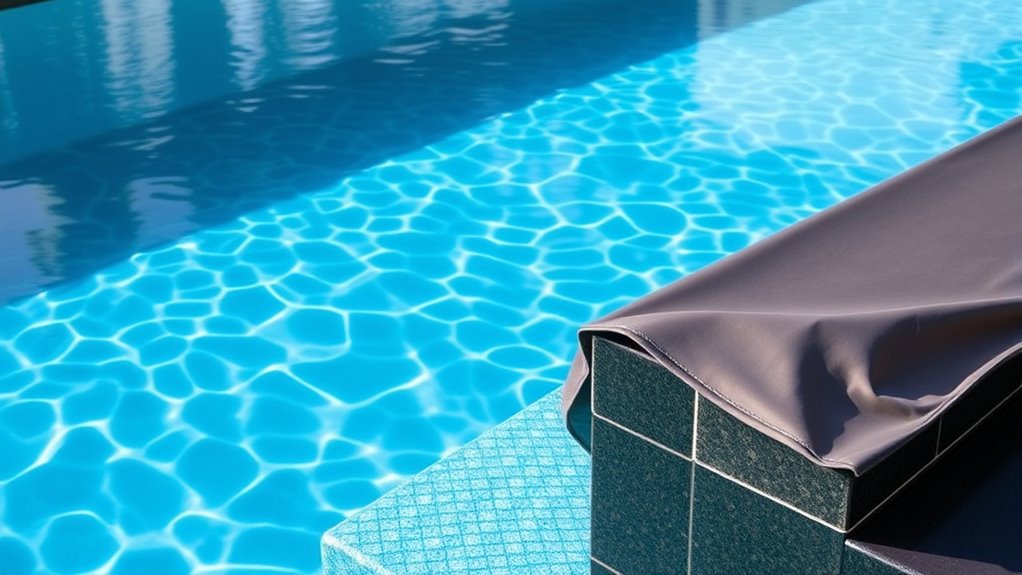
Cover your pool whenever it’s not in use to protect it from debris, dirt, and the elements. A cover prevents leaves, insects, and dust from contaminating the water, reducing the need for frequent cleaning and chemical adjustments. It also shields your pool from UV rays, which can break down chemicals and promote algae growth. Using a quality cover helps maintain water temperature, saving energy and reducing heating costs. Make sure the cover fits securely to prevent debris from slipping in and to keep the water clean. When not swimming, covering your pool is an easy step that considerably extends the clarity and quality of the water. Incorporating vertical storage solutions around your pool area can also help organize cleaning supplies and accessories, making maintenance easier and more efficient. It’s a simple, effective way to keep your pool crystal clear and ready whenever you want to enjoy it.
Frequently Asked Questions
How Often Should I Replace My Pool Filter?
You should replace your pool filter every 1 to 2 years, depending on usage and water quality. Regularly check the filter’s condition; if it looks clogged or worn, replace it sooner. In addition to replacement, clean your filter monthly to maintain peak performance. Proper maintenance ensures clear water and extends the life of your filter, keeping your pool inviting and safe for swimming.
What Are Natural Alternatives to Chemical Disinfectants?
You can use natural alternatives like UV sanitation, mineral purifiers, and ozone generators to disinfect your pool. UV systems kill bacteria without chemicals, while mineral purifiers release silver or copper ions that inhibit algae and germs. Ozone effectively destroys pathogens and reduces the need for chemical disinfectants. These options keep your pool water clean and safe, providing an eco-friendly approach that minimizes chemical exposure and maintains crystal-clear water.
Can Sunlight Affect My Pool’s Water Clarity?
Sunlight can definitely affect your pool’s water clarity. It encourages algae growth, causes water to turn green or cloudy, and depletes chlorine faster. To combat this, you should regularly use a pool cover, add algaecides, or employ UV sterilizers. By controlling sunlight exposure and maintaining proper chemical levels, you keep your water sparkling clear and inviting, ensuring your pool remains a invigorating oasis rather than a murky hazard.
How Does Weather Impact Water Chemistry Balance?
Weather impacts your pool’s water chemistry by causing fluctuations in temperature, sunlight, and rainfall. Hot, sunny days can increase evaporation and algae growth, requiring more sanitizer. Rain can dilute chemicals, throwing off pH and alkalinity levels. Wind and storms stir debris into your pool, making balancing chemicals more challenging. You need to regularly test and adjust your water chemistry to maintain clarity, especially during changing weather conditions.
Are There Eco-Friendly Ways to Maintain Pool Water Quality?
Did you know that eco-friendly pool maintenance can reduce chemical use by up to 50%? You can keep your water quality high by using natural products like mineral-based sanitizers, UV sterilizers, and ionizers. Regularly maintaining proper filtration and balancing pH levels also minimizes chemical dependence. These methods protect your health and the environment, ensuring your pool stays crystal clear without harming ecosystems or your family’s well-being.
Conclusion
By sticking to these simple steps, you’ll find your endless pool stays crystal clear—almost like a lucky coincidence. Regular testing, proper maintenance, and consistent cleaning make it effortless to enjoy spotless water whenever you dip in. With a little attention, your pool’s clarity becomes second nature, turning pool days into pure delight. After all, keeping your water pristine isn’t just routine; it’s the secret to endless, revitalizing swims whenever you want them.
